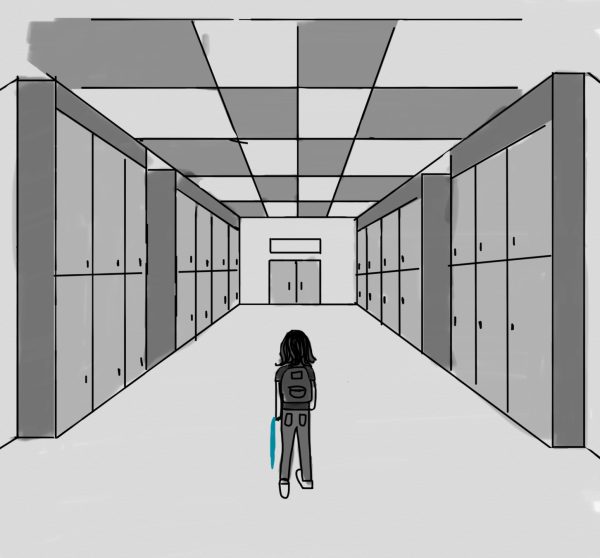School is meant to be a safe place for students to gain an education. Despite this, some students have been violated in unforgivable ways, in the very same building where they learn math and science. Unfortunately, Redwood High School is not immune to an issue that plagues the country, sexual assault and harassment is present in our school, and we’re not alone. Data released by the U.S. Department of Education Office for Civil Rights from the 2020-2021 school year revealed that there were 2,700 cases of sexual assault and an additional 40,100 cases of sexual harassment in schools K-12 nationwide.
On a more local level, 16 percent of Redwood students have experienced sexual assault or harassment during school, based on the data from the March 2024 Bark survey. An additional six percent are unsure of whether or not they have been sexually assaulted or harassed.

According to the Rape, Abuse and Incest National Network (RAINN), an anti-sexual violence organization, sexual assault refers to sexual contact or behavior that occurs without the explicit consent of the victim. Sexual harassment is a bit different and refers to unwanted and inappropriate sexual remarks or advancements. These are not problems that Redwood is unfamiliar with.
Additionally, data from the Bark survey reveals that 50 percent of Redwood students do not know how to report sexual assault or harassment at Redwood. Spencer DeWoody, the wellness coordinator at Redwood, has a role that includes case managing all the mental health needs of Redwood students. DeWoody has dealt with cases of sexual assault and harassment in the past.
“I will protect or do my best to protect a student [who has been sexually assaulted or harassed] and their anonymity through this process,” DeWoody said.
There are multiple ways a student can make a report, but often students find the need to stay anonymous which leads them astray from reporting.
Redwood students can always contact the guidance counselors and teachers when discussing an incident. Despite this, the district prefers all cases discussed to be reported back to them, so anonymity is only sometimes reassured.
“[If a student wanted to] report anonymously, I would tell [that student] to put it into the tip line [so that] your name isn’t attached to it,” DeWoody said.
“Sometimes [students] see another [student] report and nothing happens, [which can] dissuade them from wanting to make a report, ” said DeWoody, “I’m hoping to change that piece of it with more education.”
DeWoody also commented on the laws in place to protect students. DeWoody also explained the laws in place to protect students, such as Title IX, which can protect students from harassment or assault.
Title IX is a U.S. law that forbids discrimination based on sex in any educational program or activity that receives federal funding. Playing a crucial role in addressing cases of sexual harassment or assault at schools, Title IX holds regulations to investigate allegations promptly and fairly. The policies put in place provide support for victims and take appropriate disciplinary action against offenders. Title IX mandates that schools create environments free from sexual harassment and assault, making sure all students are given equal access to education without fear, discrimination or harm.
“It’s one extra layer of protection outside of the mandated reporting that I, as a therapist, have to do,” DeWoody said.
A Redwood sophomore, who will be called “Jess” for anonymity’s sake, had her own experience with sexual harassment at Redwood.

Jess was uninterested in reporting the incident.
“[I wouldn’t report it] because I prefer to deal with it myself, rather than turning it into something bigger,” Jess said.
Unfortunately, Jess isn’t alone in this belief. Schools can’t take issues like this lightly, but the process of effectively dealing with the issue appears daunting to many students.
For the students who have had to experience this, it can often be a sensitive topic and one that they would prefer to put behind them instead of having to relive it in a lengthy process full of inquisitions and doubts.
Yet, an issue so large cannot go undealt with. Luckily, Redwood has many people whom students can discuss these kinds of issues with, including student guidance counselors, or Spencer DeWoody and Magdalena Maguire who are therapists in the Wellness Center.
Students having an adult to talk to at school can be very important.
“If I were to talk to someone at school [I would feel comfortable] talking to my guidance counselor,” Jess said.
Not only is support for these students crucial but it should also be noted that it is important to put actions into place in an attempt to potentially stop them from happening in the first place. Redwood needs to incorporate education on this topic, to prevent cases of sexual assault and harassment from occurring and to help students learn how to report it, and students like Jess agree.
“I think that Redwood should teach students how to report incidents,” Jess said.
This large issue is not without a solution. Finding a way to incorporate a lesson in classrooms not only about what is considered sexual assault or harassment but also what students who have experienced it can do would help reach the students who do not know how to report these types of issues. If Redwood takes action to bring awareness and openly communicates with students about sexual assault and harassment at school, the unfortunate numbers can change for the better.
The Redwood tip line is a confidential resource for parents and students to use when dealing with any issues of the health or safety of students.
Anonymous tip line: 415-945-3693








